 Petzlover
Petzlover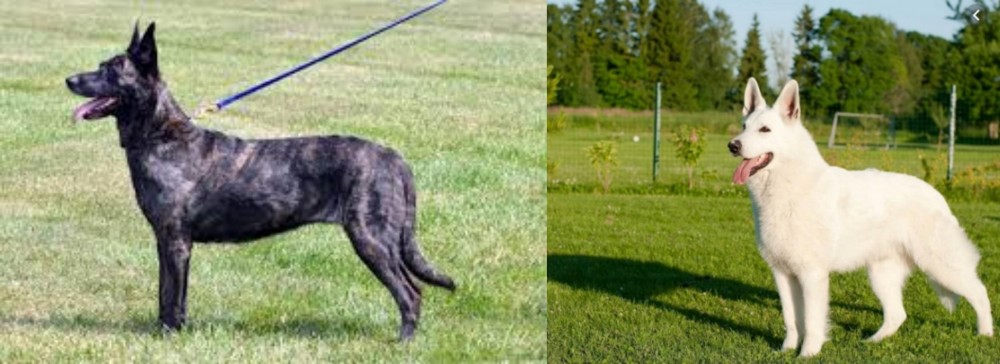 Dutch Shepherd is originated from Netherlands but White Shepherd is originated from United States. Both Dutch Shepherd and White Shepherd are having almost same height. Dutch Shepherd may weigh 8 kg / 17 pounds lesser than White Shepherd. Both Dutch Shepherd and White Shepherd has almost same life span. Both Dutch Shepherd and White Shepherd has same litter size. Both Dutch Shepherd and White Shepherd requires Moderate Maintenance.
Dutch Shepherd is originated from Netherlands but White Shepherd is originated from United States. Both Dutch Shepherd and White Shepherd are having almost same height. Dutch Shepherd may weigh 8 kg / 17 pounds lesser than White Shepherd. Both Dutch Shepherd and White Shepherd has almost same life span. Both Dutch Shepherd and White Shepherd has same litter size. Both Dutch Shepherd and White Shepherd requires Moderate Maintenance.
 The Dutch Shepherd is of Dutch origin, hailing from the Netherlands. They were originally used as herding dogs on the farms, where they became a jack-of-all-trades type of dog.
The Dutch Shepherd is of Dutch origin, hailing from the Netherlands. They were originally used as herding dogs on the farms, where they became a jack-of-all-trades type of dog.
The Dutch Shepherd in those days, 100 odd years ago, were also known as Hollandse Herders.
These dogs are more rare in modern days, but when you do find them, they are being used as police or security dogs, as guides for the blind, or simply as family friends.
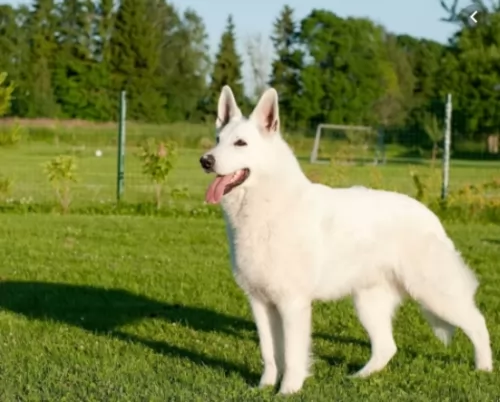 The German Shepherd and the white German Shepherd are the same dog - the only thing is that their coat colors vary.
The German Shepherd and the white German Shepherd are the same dog - the only thing is that their coat colors vary.
The White Shepherd evolved because people were looking for a working companion dog with a high degree of intelligence and a white coat.
The development of the White Shepherd began at the time of the 19th and 20th centuries. A breeding program was started but in 1933, the white coat color was made a disqualification in the German Shepherd Dog breed standard.
Not to be deterred, it was in 1969 that the U.S. and Canada formed White German Shepherd breed clubs and the breed was actually recognized by the UKC in 1999.
 The Dutch Shepherd dog is very similar in appearance to the popular German Shepherds, being a medium to large sized dog.
The Dutch Shepherd dog is very similar in appearance to the popular German Shepherds, being a medium to large sized dog.
The males are slightly heavier than females, but both males and females can stand between 55 and 62cm and weigh between 20 and 32kg.
There are actually 3 varieties found in the Dutch Shepherd dogs - short-haired, long-haired, and wiry or rough-haired. The dog has a double coat, consisting of a woolly undercoat and a top coat. The basic color of the coat is gold or silver through to red, giving rise to the brindle variations. Too much black or white seen in the fur is considered a fault.
In 1914 it was decided that brindle coats would distinguish them from the others.
The eyes of the Dutch Shepherd are dark, almond shaped and slightly slanting, while the medium sized ears are erect and high on the head and the thick tail is slightly curved. The dog has an unusually long tongue which is often found hanging out.
Early training and socializing for this dog is important so that he can learn to stay calm around new people, or visitors to the property.
The beautiful Dutch Shepherd doesn’t like being left alone for too long, loving rather to be involved with all that the family is involved in. They get on well with other pets in the home as well as being child-friendly.
They are happy dogs, who can also be smart and cunning, therefore highly trainable. They soak up new commands easily. Dutch Shepherds are also good watchdogs as they are fiercely loyal, and do not take kindly to strangers.
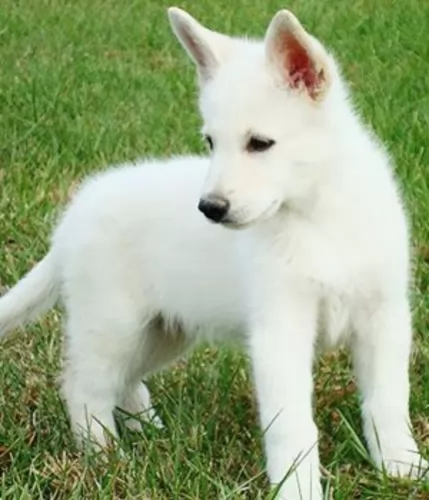 The White Shepherd is a true beauty and is a medium to large-sized dog that is muscular and strong. He stands at between 55 and 65cm in height and weighs between 35 and 40kg.
The White Shepherd is a true beauty and is a medium to large-sized dog that is muscular and strong. He stands at between 55 and 65cm in height and weighs between 35 and 40kg.
He is somewhat longer than tall. The double coat is medium length, dense, straight and white. He is a fairly heavy shedder. He has an intelligent face, a long muzzle and erect ears. The long tail is low-set.
This beautiful dog’s face tells you that he is highly intelligent. He can be easily trained. The bright eyes are eager and alert and he is ready to be an excellent guard dog and take his role as protector and guardian seriously.
The White Shepherd loves his human family and isn't overly enthusiastic around strangers. They’re playful dogs and will make great playmates for children. They also aren’t aggressive with other dogs and will get on well with other pets in the house.
 Your alert, intelligent and somewhat rare Dutch Shepherd is a loyal, protective dog, and while he can be aggressive around intruders and be a great guard dog, he can also be a gentle, loving animal around his human family members.
Your alert, intelligent and somewhat rare Dutch Shepherd is a loyal, protective dog, and while he can be aggressive around intruders and be a great guard dog, he can also be a gentle, loving animal around his human family members.
Though his tongue is long and often hangs out, you won’t have to contend with drooling. He is a wonderfully active dog and doesn’t easily gain weight. He isn’t a barker or howler, and his exceptional intelligence makes him highly trainable.
Whether there are children or other animals in the house, you can rely on your Dutch Shepherd to get on well with them, making him a wonderful family pet and canine friend.
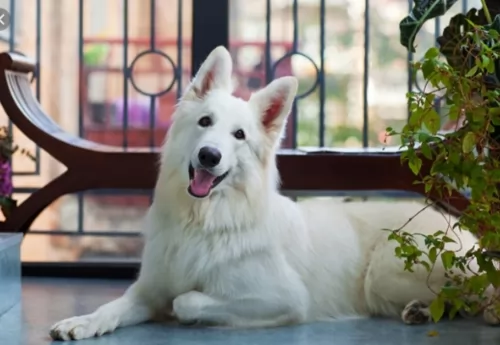 The White Shepherd is such a beautiful dog and he has some great characteristics to match his good looks.
The White Shepherd is such a beautiful dog and he has some great characteristics to match his good looks.
He is friendly and amicable with his human family and is a great protector as well. He isn’t aggressive yet he makes a great watchdog.
He is loving and loyal and forms strong bonds with his human family. Bringing him into your home and heart is guaranteed to confirm the opinion held that dogs are man's best friend.
 The Dutch Shepherd dogs are the healthiest of the Shepherd breeds. They have relatively few health problems.
The Dutch Shepherd dogs are the healthiest of the Shepherd breeds. They have relatively few health problems.
However, like the German Shepherds they may develop hip dysplasia, but this is in fact fairly rare. Get your pet to the vet if you suspect this in your dog because it can lead to lameness.
In 2018 the University of Minnesota identified a disease in Dutch Shepherds called Miositis. This is an inflammatory myopathy causing painful inflammation of the skeletal muscle tissue.
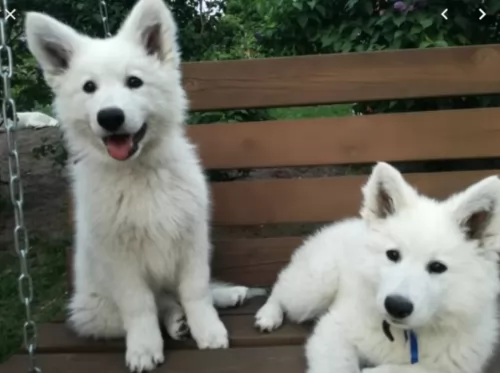 The White Shepherd shares health problems much the same as the German Shepherd, and one of these is hip dysplasia.
The White Shepherd shares health problems much the same as the German Shepherd, and one of these is hip dysplasia.
These dogs are at risk of getting hip dysplasia. It’s a congenital disorder with dogs inheriting the disease from their parents. Some young dogs can get the disease too. Because they are such active dogs, the White Shepherd is at risk of dysplasia. There are a number of signs you can look for in your dog and some of these are -
Your vet may want x-rays to examine your dog's hips. Your vet will want to slow the development of the disease and also ease the pain in your pet. There are other steps the vet will suggest to you that can make it as comfortable as possible for your pet.
 Unfortunately Dutch Shepherds shed quite a bit of hair during their shedding period in spring and autumn. This makes regular brushing important during these seasons so as to remove the dead hairs, especially from the undercoat.
Unfortunately Dutch Shepherds shed quite a bit of hair during their shedding period in spring and autumn. This makes regular brushing important during these seasons so as to remove the dead hairs, especially from the undercoat.
The wire- or rough-haired variety shouldn’t be brushed but should rather be groomed by a professional groomer every 6 months or so.
Their nails need to be trimmed when necessary, to avoid cracking, splitting, or an injury.
Their ears can be cleaned weekly to get rid of any debris or wax build-up. This, if left, can lead to infection. Brush his teeth 2 or 3 times a week to avoid dental disease which brings on a host of illnesses.
These dogs do need regular exercising, and at the same time need to be physically and mentally stimulated. He is the kind of dog that has been used for herding purpose on the farm and he just craves activity. Take him with you on your walks and include him in ball games, hikes, jogging, swimming or when you go cycling – he is game for all kinds of activities.
The formula for their diet would be that of a medium to large dog with high energy levels. The top commercially manufactured foods have been developed to include all the important vitamins and minerals. Fish oil can also be added to their food to keep the coat shiny.
Add in cooked rice, cooked vegetables and chicken from time to time and be sure to add in some raw meat occasionally to prevent problems with the skin. Always ensure that your pet has fresh, cool water to drink.
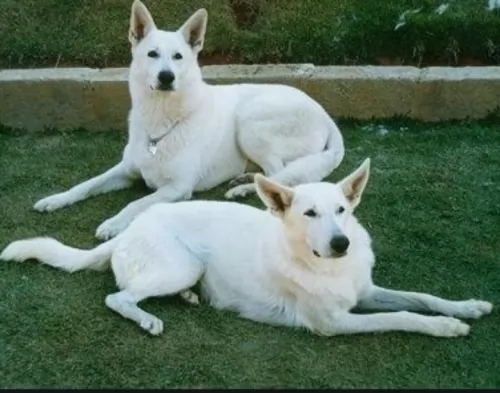 The White Shepherd's weather-resistant double coat will need to be brushed regularly as he is quite a heavy shedder. When brushing him, check for ticks and fleas as well as any unusual lumps.
The White Shepherd's weather-resistant double coat will need to be brushed regularly as he is quite a heavy shedder. When brushing him, check for ticks and fleas as well as any unusual lumps.
This beautiful dog was developed from a herding breed so he is very active. He will love a walk every day but that won’t be sufficient. He just loves ball games, and if you take him to the park, he’ll love you throwing sticks for him or the frisbee.
Because of his intelligence, he will require mental and physical stimulation. You get some toys for dogs where you can put some kibble in the toy and he has to figure out a way to get the food out.
The White Shepherd is an active dog, so to keep him that way, ensure he gets good food which has the right balance of vitamins.
There are good commercially manufactured dog foods on the market, but the idea is to know how to choose the high-quality ones and to avoid the ones that can actually jeopardize your dog’s health.
Always read the write-up on the packaging and choose according to your pet’s age and his activity levels.
It is always a good idea to give such a dog some home-made food too. Not any kind of home-made food either because you have to be careful with dogs to avoid them suffering from abdominal pain. They like their food plain and simple – boiled chicken, brown rice and vegetables.
Some raw meat occasionally is also good. Don’t forget to ensure a constant supply of cool, fresh water.